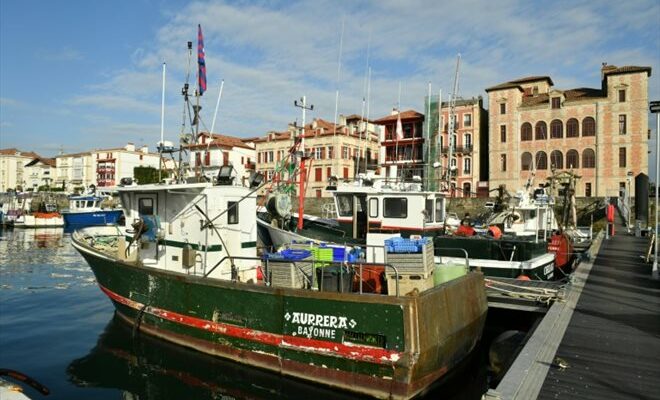Fishing boats docked at the port of Saint-Jean-de-Luz, March 30, 2023 in the Pyrénées-Atlantiques (AFP/Archives/GAIZKA IROZ)
This is unheard of since 1945: most of the fishing boats remained docked on Monday in the Bay of Biscay to preserve the dolphins, a month-long ban which is distressing the industry despite the aid announced.
Off the coast of a vast area stretching from Finistère to the Basque Country, the stoppage concerns boats, French or foreign, over eight meters and certain fishing techniques until February 20.
At the Saint-Jean-de-Luz fish market (Pyrénées-Atlantiques), where between 1,800 kilos and 5 tonnes of fish are sold every day depending on arrivals, the last catches of the weekend have been completed.
“Tomorrow it will be calmer, we will have 90% less tonnage,” explains Julien Micheo, fish merchant, who plans to close for a month.
In La Rochelle further north, the port, flown over by seagulls, was deserted on Monday, and the nets stored in crates at the dock.
This “space-time closure” must be repeated during the winters of 2025 and 2026 in the name of protecting dolphins. It was decreed after the Council of State, contacted by environmental associations, asked the government to act to reduce the deaths of small cetaceans accidentally caught in nets.
Ciem, the international scientific reference body, estimates that around 9,000 common dolphins die each year from accidental capture on the French Atlantic coast, for a sustainable level of 4,900 deaths at most.
It recommends closures of three months in winter and at least one month in summer, periods of peak dolphin mortality.
– “Forced vacation” –
Serge Larzabal, president of the interdepartmental fisheries committee of Landes and Pyrénées-Atlantiques, nevertheless considers the ban pronounced “totally out of proportion to the little danger to the stock of marine mammals”.

Fishing boats docked at the port of Saint-Jean-de-Luz, March 30, 2023 in the Pyrénées-Atlantiques (AFP/Archives/GAIZKA IROZ)
He also regrets the abandonment of the exemptions initially planned for vessels equipped with cameras or deterrent means, which the Council of State judged at the end of December “too important for the closure of fishing to have a sufficient effect on accidental catches” .
Sea Shepherd France deplores “a wall of denial and demonization of NGOs, skillfully orchestrated by the Fisheries Committees to prevent any constructive dialogue and divert attention from their own failings and lies.”
According to the association, “it will take measures that extend much further over time” to achieve a significant drop in catches.
In total, 450 French boats are expected to remain at the dock.
At the fish market in the small Basque port town, fish merchant André Gloaguen is worried about his customers, mainly fishmongers, who “have salaries to pay, charges to pay. “I don’t know how they’re going to do it,” says -he, he who will take “forced vacation without pay”.
Franck Lalande, vice-president of the Regional Fisheries Committee of Nouvelle-Aquitaine and owner of two boats in Arcachon (Gironde) fears “breakage”, because “a boat at the dock is between 250,000 and 300,000 euros in loss of turnover for one month.
– Inflation likely –
To compensate, the Minister of Ecological Transition Christophe Béchu promised compensation on Friday varying “between 80 and 85% of turnover for all boats” affected by the ban.

Fishing boats docked at the port of Saint-Jean-de-Luz, March 30, 2023 in the Pyrénées-Atlantiques (AFP/Archives/GAIZKA IROZ)
He also promised to support the rest of the sector, notably with aid to fishmongers which will go “up to 75% of their losses”.
“This closure (…) will result in 8,000 tonnes less seafood and represent a loss of 60 million euros in turnover for the fish trade”, already weakened by Brexit, warned Frédéric Toulliou, president of the French fish trade union (UMF) and the inter-professional association France Filière Pêche.
Maëlise Mouhu, fishmonger in La Rochelle, predicts inflation for the end consumer. “When 450 boats stop in France, that inevitably has an impact. There will be less input and therefore more expensive fish,” she warns.
“Today we have 80% imported fish on French plates. Do we want to go below the 20% contribution, to import more fish caught in unworthy conditions at the other end? of the world?”, warns the president of the national fisheries committee, Olivier Le Nézet.
“We want to keep a French fishing industry, and reconcile it with the imperatives of preserving biodiversity,” Mr. Béchu promised on Friday.
© 2024 AFP
Did you like this article ? Share it with your friends using the buttons below.




